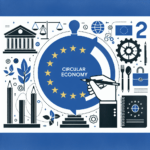
**Building a Sustainable Future: Updates on European Consumer Protection Regulations**
In recent years, growing awareness of environmental issues has led to a renewed interest in sustainability in business practices. In the face of the need to protect consumer rights and encourage eco-friendly choices, the European Parliament is committed to reforming and updating existing regulations. These changes aim to ensure a transition toward a circular economy, where reuse and recycling of materials become the norm rather than the exception.
### Banning Greenwashing
A central theme of these new regulations concerns the issue of greenwashing. This term refers to the rather misleading practice of presenting a product as eco-friendly or sustainable without concrete evidence to support such claims. The European Parliament has identified this practice as a threat to consumer trust and the effectiveness of environmental policies.
To address this problem, specific bans are being implemented. First, general statements regarding the environmental impact of a product will not be allowed unless accompanied by verifiable documentation. Additionally, it will be prohibited to claim that a product has a neutral or positive environmental impact unless there is credible offsetting of emissions by the producer. This means companies will need to provide concrete proof of their claims, which represents a significant step toward greater accountability.
Another important aspect concerns sustainability labeling. The European Union plans to abolish the use of labels not based on approved or established certification schemes from public entities. This measure aims to ensure that consumers can trust the information they receive and make informed choices.
### Promoting Product Durability
In addition to combating greenwashing, the European Parliament intends to promote product durability. The new regulations will ensure that consumers are fully aware of the warranties offered on products. Currently, consumers are entitled to a warranty of at least two years, during which they can request repairs for defective products at the seller’s expense. However, with the new rules, there will also be a special indication for products that benefit from an extended warranty period.
This focus on durability also extends to the advertising practices of companies. Advertising of goods that have design features intended to reduce the product’s lifespan will not be allowed. This implies a critical review of how products are designed and marketed, pushing companies to consider not only immediate profit but also the long-term impact of their production choices.
Furthermore, it will no longer be acceptable to present goods as repairable if they are not. This measure is crucial as it encourages the design of products that are easier to repair and contributes to a reuse culture. Consumers will thus be able to rely on products that are not only designed to last but are also easily repairable, reducing the need for frequent replacements.
### A Step Toward a Circular Economy
The path taken by the European Parliament is not limited to stricter regulations; it represents a commitment to building a circular economy. This economic model, which opposes the traditional linear paradigm of “production-consumption-disposal,” aims to keep materials in use as long as possible. This means not only reusing and recycling materials but also considering how products are designed from the outset, taking into account their end of life and recovery opportunities.
In a circular economy, waste reduction and resource optimization become the norm. This implies empowering consumers, who will be able to choose products not only based on price and aesthetics but also on their sustainability and durability. The collective awareness regarding sustainable business practices is expected to grow, fostering a more responsible consumption landscape.


